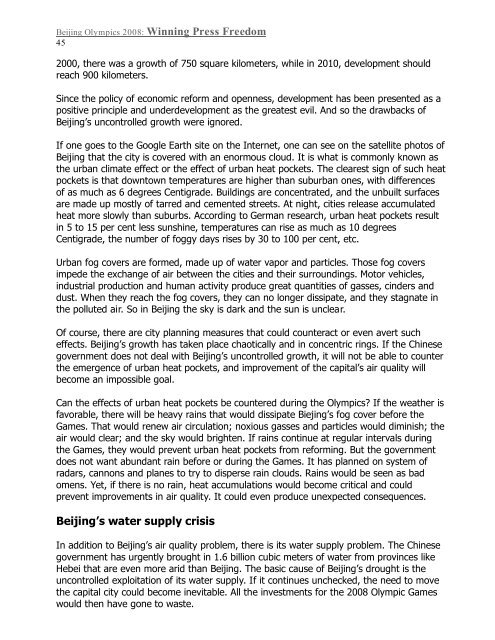Beijing Olympics 2008: Winning Press Freedom - World Press ...
Beijing Olympics 2008: Winning Press Freedom - World Press ...
Beijing Olympics 2008: Winning Press Freedom - World Press ...
You also want an ePaper? Increase the reach of your titles
YUMPU automatically turns print PDFs into web optimized ePapers that Google loves.
<strong>Beijing</strong> <strong>Olympics</strong> <strong>2008</strong>: <strong>Winning</strong> <strong>Press</strong> <strong>Freedom</strong><br />
45<br />
2000, there was a growth of 750 square kilometers, while in 2010, development should<br />
reach 900 kilometers.<br />
Since the policy of economic reform and openness, development has been presented as a<br />
positive principle and underdevelopment as the greatest evil. And so the drawbacks of<br />
<strong>Beijing</strong>’s uncontrolled growth were ignored.<br />
If one goes to the Google Earth site on the Internet, one can see on the satellite photos of<br />
<strong>Beijing</strong> that the city is covered with an enormous cloud. It is what is commonly known as<br />
the urban climate effect or the effect of urban heat pockets. The clearest sign of such heat<br />
pockets is that downtown temperatures are higher than suburban ones, with differences<br />
of as much as 6 degrees Centigrade. Buildings are concentrated, and the unbuilt surfaces<br />
are made up mostly of tarred and cemented streets. At night, cities release accumulated<br />
heat more slowly than suburbs. According to German research, urban heat pockets result<br />
in 5 to 15 per cent less sunshine, temperatures can rise as much as 10 degrees<br />
Centigrade, the number of foggy days rises by 30 to 100 per cent, etc.<br />
Urban fog covers are formed, made up of water vapor and particles. Those fog covers<br />
impede the exchange of air between the cities and their surroundings. Motor vehicles,<br />
industrial production and human activity produce great quantities of gasses, cinders and<br />
dust. When they reach the fog covers, they can no longer dissipate, and they stagnate in<br />
the polluted air. So in <strong>Beijing</strong> the sky is dark and the sun is unclear.<br />
Of course, there are city planning measures that could counteract or even avert such<br />
effects. <strong>Beijing</strong>’s growth has taken place chaotically and in concentric rings. If the Chinese<br />
government does not deal with <strong>Beijing</strong>’s uncontrolled growth, it will not be able to counter<br />
the emergence of urban heat pockets, and improvement of the capital’s air quality will<br />
become an impossible goal.<br />
Can the effects of urban heat pockets be countered during the <strong>Olympics</strong>? If the weather is<br />
favorable, there will be heavy rains that would dissipate Biejing’s fog cover before the<br />
Games. That would renew air circulation; noxious gasses and particles would diminish; the<br />
air would clear; and the sky would brighten. If rains continue at regular intervals during<br />
the Games, they would prevent urban heat pockets from reforming. But the government<br />
does not want abundant rain before or during the Games. It has planned on system of<br />
radars, cannons and planes to try to disperse rain clouds. Rains would be seen as bad<br />
omens. Yet, if there is no rain, heat accumulations would become critical and could<br />
prevent improvements in air quality. It could even produce unexpected consequences.<br />
<strong>Beijing</strong>’s water supply crisis<br />
In addition to <strong>Beijing</strong>’s air quality problem, there is its water supply problem. The Chinese<br />
government has urgently brought in 1.6 billion cubic meters of water from provinces like<br />
Hebei that are even more arid than <strong>Beijing</strong>. The basic cause of <strong>Beijing</strong>’s drought is the<br />
uncontrolled exploitation of its water supply. If it continues unchecked, the need to move<br />
the capital city could become inevitable. All the investments for the <strong>2008</strong> Olympic Games<br />
would then have gone to waste.





